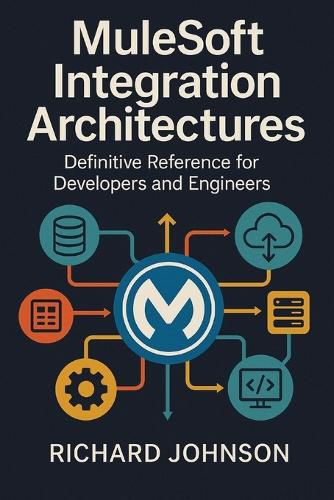Readings Newsletter
Become a Readings Member to make your shopping experience even easier.
Sign in or sign up for free!
You’re not far away from qualifying for FREE standard shipping within Australia
You’ve qualified for FREE standard shipping within Australia
The cart is loading…






This title is printed to order. This book may have been self-published. If so, we cannot guarantee the quality of the content. In the main most books will have gone through the editing process however some may not. We therefore suggest that you be aware of this before ordering this book. If in doubt check either the author or publisher’s details as we are unable to accept any returns unless they are faulty. Please contact us if you have any questions.
"MuleSoft Integration Architectures" is a comprehensive guide that empowers enterprise architects, developers, and integration professionals to master the design and implementation of scalable, secure, and future-ready integration solutions with MuleSoft. The book begins with an in-depth exploration of the MuleSoft Anypoint Platform, unveiling its architecture, core components, and advanced cloud-native capabilities. Readers will gain practical expertise in building modular, reusable flows, understanding the runtime engine's internals, and applying API-led connectivity principles to drive successful digital transformations. As the narrative progresses, the book tackles a vast array of enterprise integration patterns, such as advanced message routing, event-driven architectures, canonical data models, and sophisticated error handling mechanisms. Practical guidance is delivered for deploying robust APIs using RAML and OpenAPI, applying dynamic policy enforcement, and implementing metadata-driven governance for full lifecycle API management. The coverage extends to hybrid, multicloud, and on-premises topologies, offering architectural blueprints for resilient, secure, and federated integration across distributed enterprise landscapes. Beyond the foundational concepts, "MuleSoft Integration Architectures" delves into advanced topics including custom connector and policy development, seamless integration with legacy systems, real-time data streaming, data quality assurance, and zero trust security paradigms. The book also emphasizes operational excellence through DevOps automation, observability, performance optimization, and compliance automation. Concluding with insights into emerging trends-such as AI/ML integration, blockchain, low-code development, and composable microservices-this guide ensures that readers are equipped to design integration architectures that meet today's demands and are prepared for tomorrow's innovations.
$9.00 standard shipping within Australia
FREE standard shipping within Australia for orders over $100.00
Express & International shipping calculated at checkout
Stock availability can be subject to change without notice. We recommend calling the shop or contacting our online team to check availability of low stock items. Please see our Shopping Online page for more details.
This title is printed to order. This book may have been self-published. If so, we cannot guarantee the quality of the content. In the main most books will have gone through the editing process however some may not. We therefore suggest that you be aware of this before ordering this book. If in doubt check either the author or publisher’s details as we are unable to accept any returns unless they are faulty. Please contact us if you have any questions.
"MuleSoft Integration Architectures" is a comprehensive guide that empowers enterprise architects, developers, and integration professionals to master the design and implementation of scalable, secure, and future-ready integration solutions with MuleSoft. The book begins with an in-depth exploration of the MuleSoft Anypoint Platform, unveiling its architecture, core components, and advanced cloud-native capabilities. Readers will gain practical expertise in building modular, reusable flows, understanding the runtime engine's internals, and applying API-led connectivity principles to drive successful digital transformations. As the narrative progresses, the book tackles a vast array of enterprise integration patterns, such as advanced message routing, event-driven architectures, canonical data models, and sophisticated error handling mechanisms. Practical guidance is delivered for deploying robust APIs using RAML and OpenAPI, applying dynamic policy enforcement, and implementing metadata-driven governance for full lifecycle API management. The coverage extends to hybrid, multicloud, and on-premises topologies, offering architectural blueprints for resilient, secure, and federated integration across distributed enterprise landscapes. Beyond the foundational concepts, "MuleSoft Integration Architectures" delves into advanced topics including custom connector and policy development, seamless integration with legacy systems, real-time data streaming, data quality assurance, and zero trust security paradigms. The book also emphasizes operational excellence through DevOps automation, observability, performance optimization, and compliance automation. Concluding with insights into emerging trends-such as AI/ML integration, blockchain, low-code development, and composable microservices-this guide ensures that readers are equipped to design integration architectures that meet today's demands and are prepared for tomorrow's innovations.